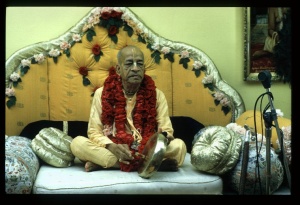SB 10.50.32-33

A.C. Bhaktivedanta Swami Prabhupada
TEXTS 32-33
sā mukto loka-nāthābhyāṁ
vrīḍito vīra-sammataḥ
tapase kṛta-saṅkalpo
vāritaḥ pathi rājabhiḥ
vākyaiḥ pavitrārtha-padair
nayanaiḥ prākṛtair api
sva-karma-bandha-prāpto 'yaṁ
yadubhis te parābhavaḥ
SYNONYMS
saḥ—he, Jarāsandha; muktaḥ—freed; loka-nāthābhyām—by the two Lords of the universe; vrīḍitaḥ—ashamed; vīra—by heroes; sammataḥ—honored; tapase—to perform austerities; kṛta-saṅkalpaḥ—having made up his mind; vāritaḥ—was stopped; pathi—on the road; rājabhiḥ—by kings; vākyaiḥ—with statements; pavitra—purifying; artha—having meanings; padaiḥ—with words; nayanaiḥ—with reasoning; prākṛtaiḥ—mundane; api—also; sva—own; karma-bandha—due to the unavoidable reactions of past work; prāptaḥ—obtained; ayam—this; yadubhiḥ—by the Yadus; te—your; parābhavaḥ—defeat.
TRANSLATION
Jarāsandha, whom fighters had highly honored, was ashamed after being released by the two Lords of the universe, and thus he decided to undergo penances. On the road, however, several kings convinced him with both spiritual wisdom and mundane arguments that he should give up his idea of self-abnegation. They told him, "Your defeat by the Yadus was simply the unavoidable reaction of your past karma."